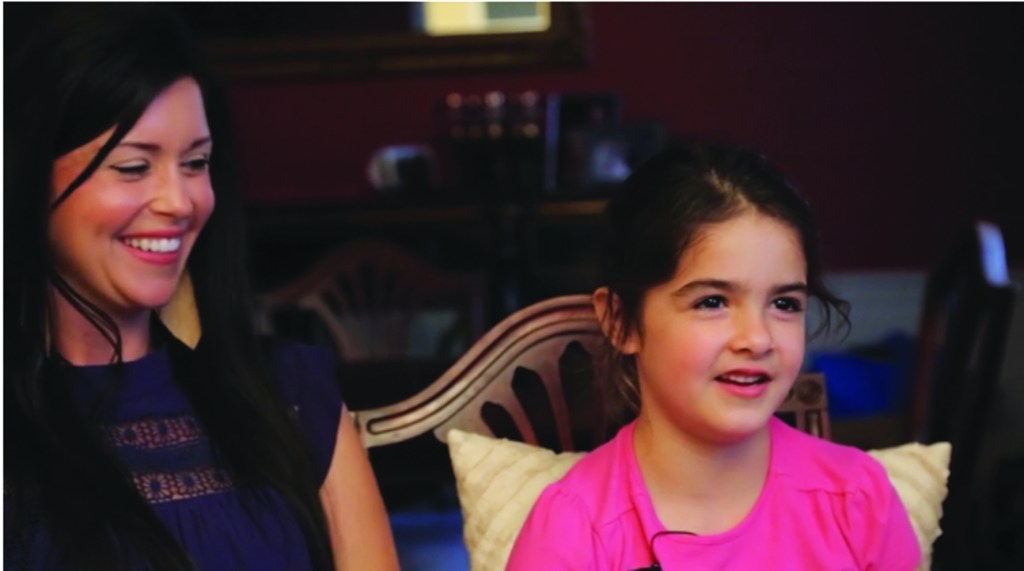CASA info meeting coming up on Feb. 27, find out what it means to volunteer
Published 9:51 am Tuesday, February 20, 2018

- Screenshot of video from casaofthebluegrass.org Jessica Johnson, with CASA of the Bluegrass, is interviewed along with Isabella for a video about being a volunteer. Johnson was Isabella's Court Appointed Special Advocate, before she was adopted by her foster parents. To see Isabella's story, visit casaofthebluegrass.org.
Helping children
Local CASA (Court Appointed Special Advocates) volunteers are urgently needed to step up and protect abused and neglected children’s best interests through the complicated court process of placing them in safe and permanent homes.
Jessica Johnson, program development director for CASA of the Bluegrass in Boyle and Mercer counties, said the family court system is overcrowded with cases and the local CASA program can’t serve every child who needs help.
Trending
Currently, CASA is being assigned only the worst of the worst cases, according to Laura Guerrant, executive director CASA of the Bluegrass in Boyle, Mercer, Anderson and Franklin counties.
But all children could be helped if there were more CASA volunteers available.
The majority of children in the family court system have one thing in common — they are in the system due to being abused or neglected, usually from the hands of their parents or guardians, Guerrant said.
The children not only have suffered from abuse or neglect; they often have a turbulent life full of social workers, investigators, police officers and attorneys coming in and out of their lives. And they have to stand before judges, all the while going to different medical professionals, therapists and interviews.
“You can see how overwhelmed it would become for a young child,” Guerrant said. “That’s where we (CASA volunteers) step in.”
Guerrant said each CASA volunteer “is one consistent person who stays with that child from the beginning of the case to the end of the case.”
Trending
She said since the number of family court cases are rapidly increasing, it’s crucial that more advocates for children in the court system be trained and available.
In 2017, nearly 300 children in Boyle, Mercer, Anderson and Franklin counties benefited by being assigned a CASA volunteer.
But, that’s only about 40 percent, if even that, Guerrant said, of the total number of children who need a CASA volunteer.
Because of the need for more volunteers, the organization is hosting a volunteer advocate informational/orientation meeting 6 p.m. Feb. 27 at the CASA of the Bluegrass Danville Office. At this meeting, specific information on the role of a CASA volunteer along with information on the upcoming volunteer training program will be shared.
Volunteer training consists of court observation, in-class sessions and pre-work. Training for the March session will begin 5 p.m. March 6 at the CASA office. For directions and/or additional information, call Jessica R. Johnson at (859) 936-3546 or email Jessica@casaofthebluegrass.org.
“We are saving lives,” Johnson said. Volunteers notice things that other people in the system don’t always see and she is convinced that children’s lives have been saved by volunteers’ involvement in certain cases.
“All of the members of the system are in and out and have multiple cases. We just have one so we’re allowed to really dig deep and get to know this child’s scenario and what their needs and wants are,” Guerrant said.
Guerrant said children who get a CASA are more likely to graduate high school and receive more targeted services. They are usually in foster care a shorter amount of time and are adopted more quickly.
Therefore being a CASA volunteer “is a wonderful way to give back to your community and to give to a future generation,” she said.
Johnson agreed. “This is our community. They are our future teachers, judges, lawyers and leaders.”
When a child in the system doesn’t have a CASA volunteer, “things can get overlooked. Paperwork gets missed and background checks don’t get made on potential placement,” Guerrant said.
“Mistakes get made; we’re all humans. So sometimes volunteers are an extra level of accountability.”
Guerrant said once the family court judge assigns a CASA volunteer to a child’s case, that volunteer becomes “an extra set of eyes and ears for the judge.”
The volunteer interviews everyone involved with the child — or children when there are siblings — and “kind of paints a lay person’s picture of the scenario of that child’s life and what’s going on at the time,” Guerrant said.
Then, volunteers make recommendations to the judge about what that child needs.
Recommendations can be as simple as the child needs to have glasses, or they should have increased visitations with the mom and dad, Guerrant said.
On the other hand, CASA volunteers sometimes have to make harsh recommendations such as the child “should never see his parents again — no contact at all,” Guerrant said.
A good volunteer is someone who is not biased and can be objective, Guerrant said. “Someone who is willing to listen and willing to speak up and make change in their community, and has a heart for children and victims.”
Johnson said CASA’s role “is like the glue that adheres all the pieces to form this complete puzzle for permanency for this child. We work with all the different agencies and collaborate together.”
“We’re not here to judge the parents,” Guerrant said. “I always say everyone is one step away from being in someone else’s shoes.
“I feel like our advocates are very knowledgeable on different family situations. People do things for different reasons and it’s not our place to judge. Our place is to make sure the child is safe.”
Johnson said volunteers are asked to commit to one year of service “because CASA’s goal is to achieve permanency for each child in a safe permanent home as quickly as possible.”
Volunteers are specially trained to understand the families and their dynamics. Johnson said, “Honestly, I want to know how did we get to this point? How did all this happen that we got into family court?”
Guerrant said volunteers look for the root of the cause of the abuse. “Overwhelmingly it is the opioid and drug epidemic that is forcing about 90 percent of cases to occur.”
“The other 10 percent — I don’t understand humanity and why they do some of the things they do,” Guerrant said.
“You never know what’s going on with these kids we see in court every single week. These kids are everywhere. They’re sitting in the classrooms with your children … and people don’t see them. That’s why we need more advocates.”
 SO YOU KNOW
SO YOU KNOW
• The CASA volunteer informational/orientation meeting will be 6 p.m. Feb. 27 at the CASA of the Bluegrass Danville Office. At this meeting you will gather specific information on the role of a CASA volunteer along with information on the upcoming volunteer training. For directions and/or additional information, call Jessica R. Johnson at (859) 936-3546 or email Jessica@casaofthebluegrass.org.
• To report suspected child abuse, call the Kentucky Child Protection Hotline at (877) 597-2331. Reports may be made anonymously.






